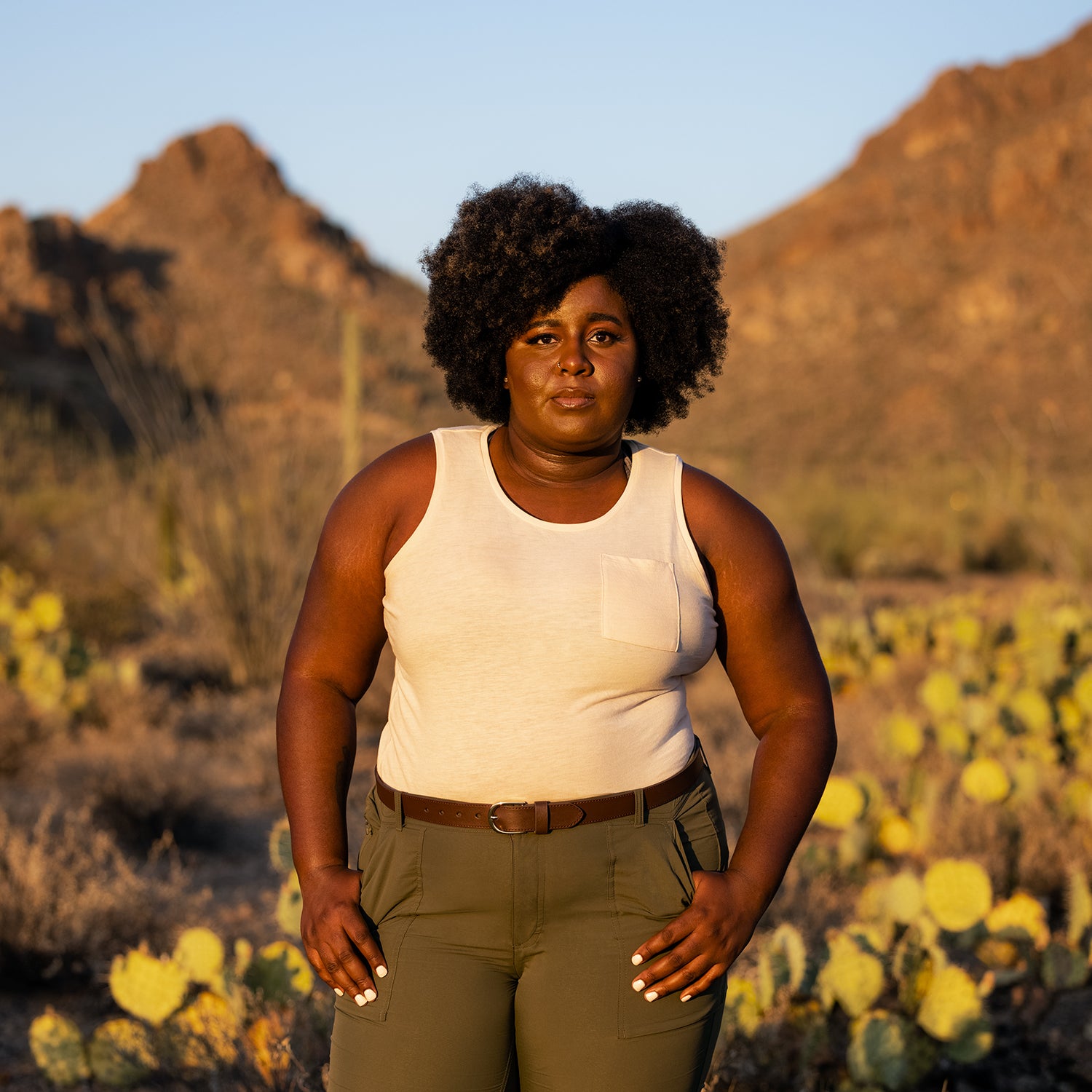Some lizards are harder to catch than others. As a saurologist, or lizard scientist, Earyn McGee knows that each species is uniquely evasive: the whiptail lizard has smooth, slick scales, while the Clark’s spiny lizard darts into the safe heights of trees. But the lizard that made McGee Twitter famous was particularly speedy.
In 2018, while completing her master’s degree at the University of Arizona, McGee needed to recapture a Yarrow’s spiny lizard, one of her three study species, in Arizona’s Chiricahua Mountains. “It was giving me a good run for my money,” she says. “It got to a point where I thought I’d lost it.” But she gave the area one last scan, and there it was on a tree—with an orange “5” painted on its back from a previous capture. Before snagging it, McGee snapped a photo that included the surrounding scrub, and later posted it to her Twitter (), captioned: “Look at this girl!” She hoped to give her followers a taste of her fieldwork.
Instead, she confounded them. “People were like, ‘We don’t see a lizard in this photo,’” McGee says. That’s when she realized that she could harness the animals’ “Where’s Waldo?” power. Hundreds of armchair herpetologists now wait for McGee’s weekly posts, where she shares fun facts about a species along with a photo in which—she swears—a lizard is hiding. “I forget to breathe when I am finding the lizard sometimes,” a follower commented on one post. The game is just one piece of the 26-year-old’s work, which also includes mentoring, cofounding the community-building organization , and earning her PhD in natural resources at the University of Arizona. (Her addresses climate change, inequities in the sciences, and, yes, lizard diets.) Still, the ethos of #FindThatLizard permeates McGee’s work: taking a curious look around, and then another one for good measure.
Growing up in Georgia, California, and New Jersey, McGee dreamed of working with charismatic fauna like elephants and wolves. She remembers staying up all night before summer camp in elementary school, watching Steve Irwin and Jeff Corwin on Animal Planet. It didn’t occur to her that she could have a job like theirs until she went to Howard University to study biology. “I started to think a little bit more radically, that I can try to make my own way,” she says.
At Howard, she was drawn to the idea of spending long periods of time in nature for fieldwork. She was later matched with an undergraduate adviser whose specialty was lizards. McGee had never been interested in the creatures, but she soon realized that their cold-blooded lifestyle was compatible with her own late-rising preference. “By the time I’m up, that’s when they’re getting out and starting to do things.”
Six years later, for her PhD, she spent weeks at a time catching lizards to collect data and understand how climate change affects their water and food sources. When we first spoke this spring, she was about to defend her dissertation, taking breaks from her research to get into pottery and curate a robust plant collection.
“It’s all connected. It’s about understanding who is going to be our next generation of natural-resources scientists, and how to make that generation more diverse.”
In the meantime, she’s made a point of supporting others who are passionate about the natural world, but who may not envision it as a career. While she was a graduate student mentoring environmental majors, McGee had a hard time recruiting underrepresented students. Eventually, she made the rare move of adding a social-science component to her PhD research: studying how to increase diversity in natural-resources careers. In September 2017, was published in the journal Science, urging STEM fields not to rest on surface-level diversity initiatives.
“It’s all connected,” McGee says. “It’s about understanding who is going to be our next generation of natural-resources scientists, and how to make that generation more diverse.” Black women remain particularly underrepresented in STEM—for example, they made up only about 3.7 percent of science graduate students in 2018. At Howard, teachers prepared students for the possibility that they’d be one of only a handful of Black people in their workplaces. McGee hopes to ensure that young scientists won’t have to deal with some of what she’s experienced, at least not on their own.
McGee’s nickname, Lizard Lassoer, nods to one of those experiences. Saurologists snag lizards using a long pole with a loop of string at one end, which most call a noose. McGee had to work up the courage to tell her colleagues that she was uncomfortable with the term. “You don’t want to stick out more than you already are. But I’m in the middle of nowhere with a bunch of white people,” McGee says, “and y’all want me to talk about noosing things?” Her preferred alternative is lasso. McGee sees this as a bare-minimum change for anyone in her field who says they care about diversity and inclusion. But still there’s pushback; people say it’s just the way it’s always been.
Science is rife with racist legacies, right down to the taxonomy: many species share names with figures who posed racist ideas as scientific facts or conducted exploitative research. McGee’s own study species is named after ornithologist H. C. Yarrow, who stole Indigenous skeletons to send to museums for research. And these problems aren’t relegated to the past. In May 2020, Amy Cooper called the cops on Black birder Christian Cooper in Central Park. For McGee and other Black researchers who often do fieldwork in remote areas, the incident was yet another reminder of feeling unsafe in nature. “How are we supposed to effectively do our jobs outside, where we see Black people being terrorized and killed?” she says. That month, McGee and other Black professionals in STEM fields, like ornithologist Corina Newsome, launched Black AF in STEM to uplift one another’s work. For their first event, , bird enthusiasts connected on Twitter and organized digital talks. Similar initiatives have followed in a wide range of other fields. “As long as Twitter exists, people will be able to search the hashtags and find community,” McGee says.
McGee finds joy in efforts like Black AF in STEM and #FindThatLizard, which are building strong communities in disciplines that need fresh perspectives. Much of her work is grounded in the idea that science has never been apolitical or unbiased, and she believes just as strongly that scientists’ identities can positively impact their work if they just acknowledge them. “My identity tells my story as a scientist,” she says. “Making it a part of my dissertation as someone in the hard sciences was super important. I feel like every time you do this, it’s revolutionary.”


